As i have mentioned in the earlier post [Trip to Kedar-Badrinath – Part 1] that we were six people trekking to the Kedarnath shrine. We had decided to trek by foot, it may take the whole day but it was fine as we had book a cottage with GMVN for the night to stay at Kedarnath.
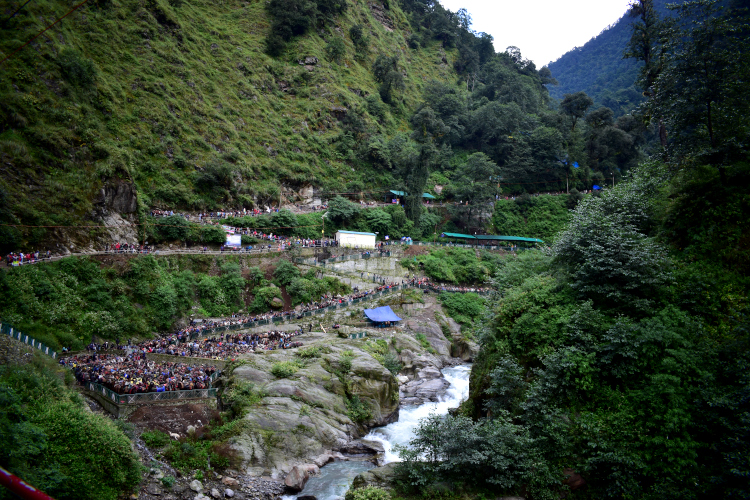
As we started to walk from Gauri Kund, Basak aunty began to feel little anxious. She was in a dilemma whether she will be able to walk all the way to the temple or not. To make the situation worse, those horse owners began to tell us ( and others too) – “It’s a very difficult trek, not possible to walk all the way – hire a horse” and so on. We all tried to encourage her but in vein, so uncle and aunty finally hired two horses. We remaining four walked our way to reach the top.
It is 16 km from Gauri Kund to Kedarnath temple. Trekking route for the first 7 km is gradual (this patch is repaired after the epic flood in 2013) but after crossing Rambara village (which has washed away completely during the flood) and Mandakini river – the route gets steeper for the next 7 km (the new trek route made after the flood). The last 2 km seemed normal, ie. more or less like plain road, so the trekking route is divided into 3 part. The first part was fine : we walked – clicked photographs – stopped for maggie – and to enjoy the scenic beauty.

The trekking route was not a easy one but all those beautiful surrounding made the tiring and wearing journey not only bearable but utterly enjoyable too. The trek route was surrounded by lush green valley. Wild flowers and gorgeous waterfalls made it extremely pleasant to trek on.
There were many people walking up the trek … some young people who want to enjoy the nature and some old people who can’t afford the price of the horse … and many with spiritual devotion on their mind.
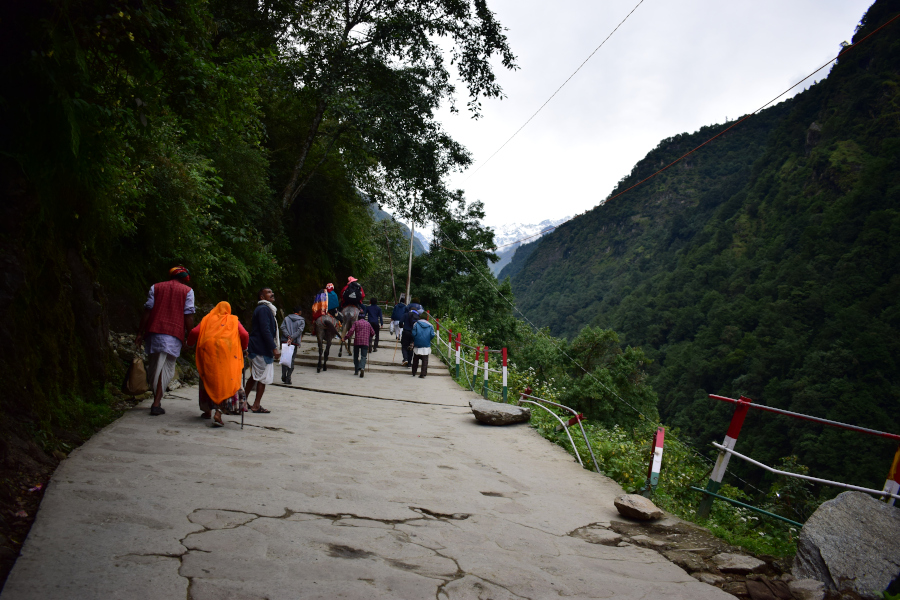

Most of the people going to the temple, hired a pony/horse, so there were less people walking on the trek. There was one difficulty that we faced initially, it was very hard to walk along side with the horses.
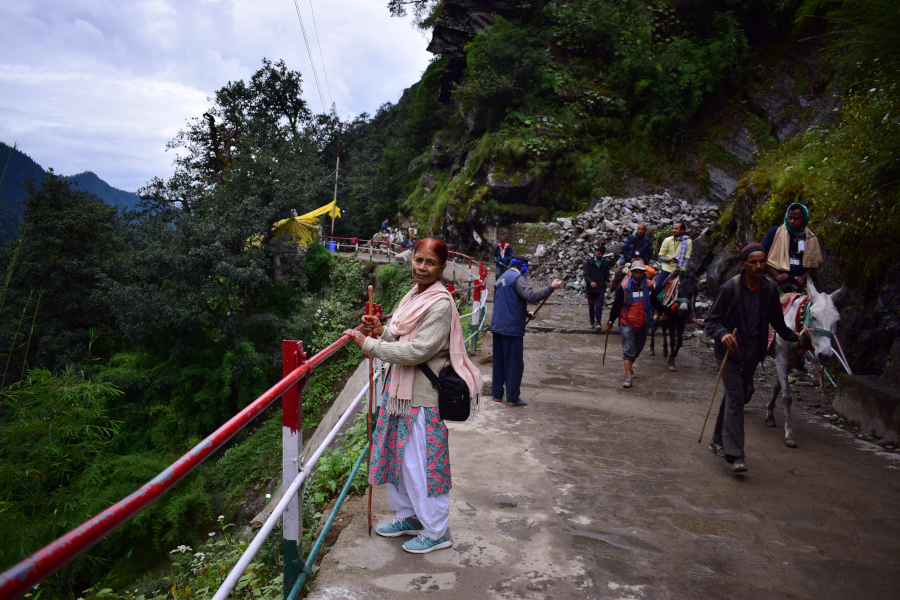
Then soon we realized that they (the horses loaded with their passengers & owners walking by their side) were always coming in a group. when we saw them coming, we stopped and moved to one side of the path & let the group pass. When they are gone, we continue our walk safely and peaceful enjoying and taking more photographs.
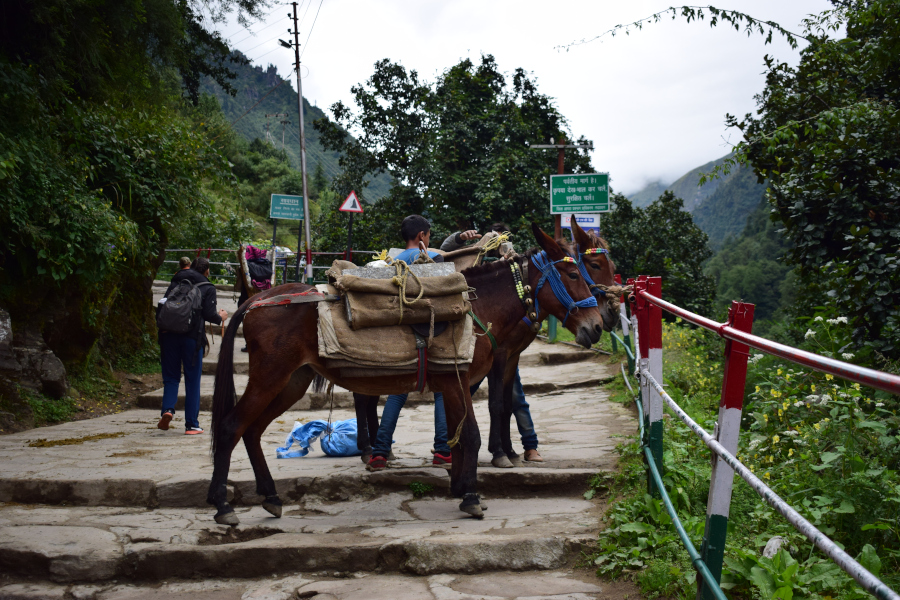
Whatever people may say, i feel it is simple exploitation of pony/horse, felt sad for those speechless animals. I can understand if you are sick or old – or you seriously have some problem, otherwise i really do not understand why these capable young people go on horse back.
On our way back from the temple next day, we saw a horse fallen down nearly unconscious. Three young men were kind enough to stop by and tried to help the poor animal. All I want to say is, we should be more kind and conscious about our doings.
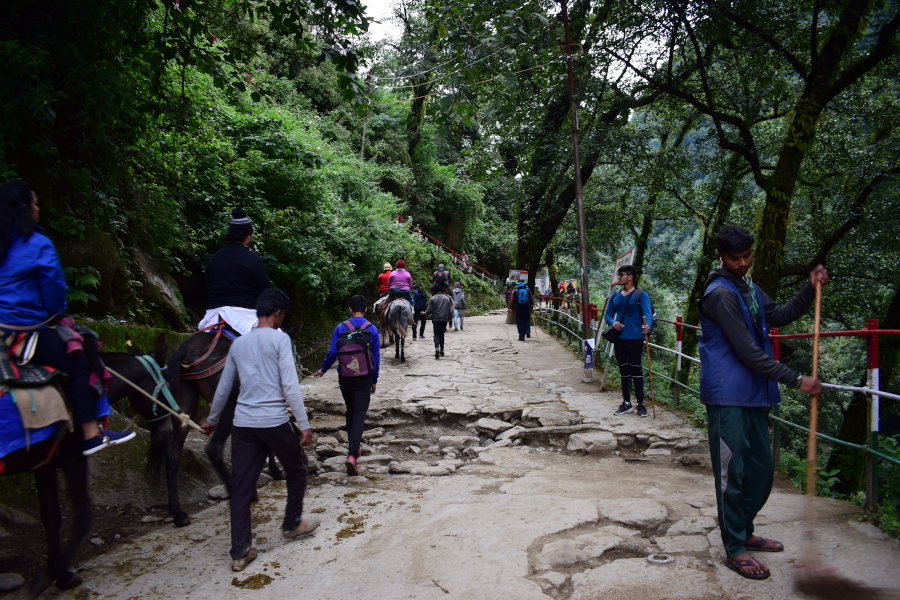
There were many people employed to sweep the road all the time and hence the roads were very much clean and walk able. I have not seen anyone littering the place … maybe because most of them were on the horse’s back holding tight to prevent fall.

Another thing that i enjoyed was watching and following the fellow trekker. Everyone was walking and stopping at their own pace, so when they stop for a break, we lead them and when we stop to take a photo, they catch up. It was like a game but played only by me and it was fun.
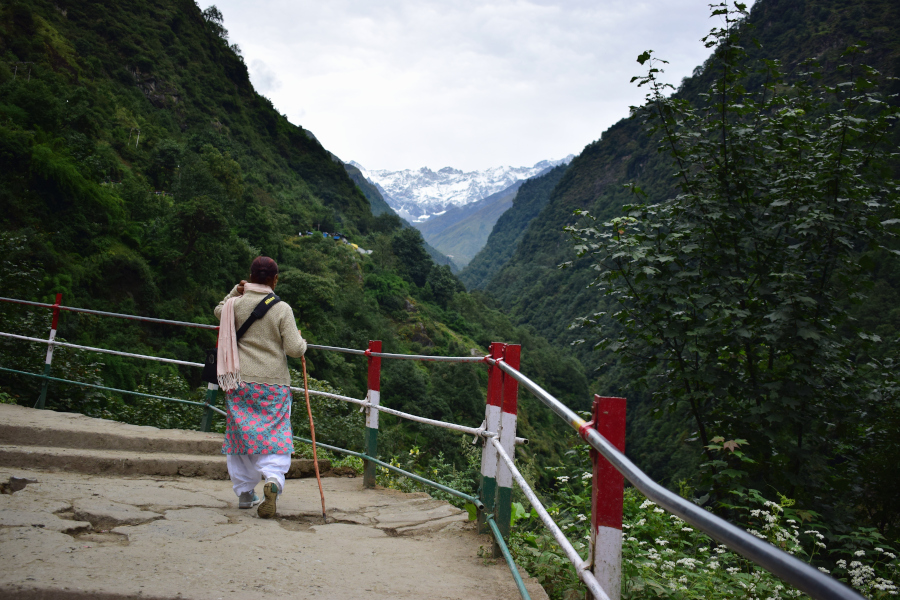
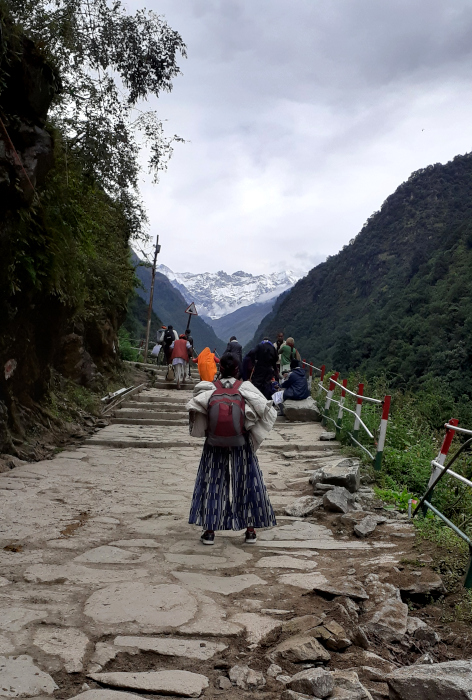
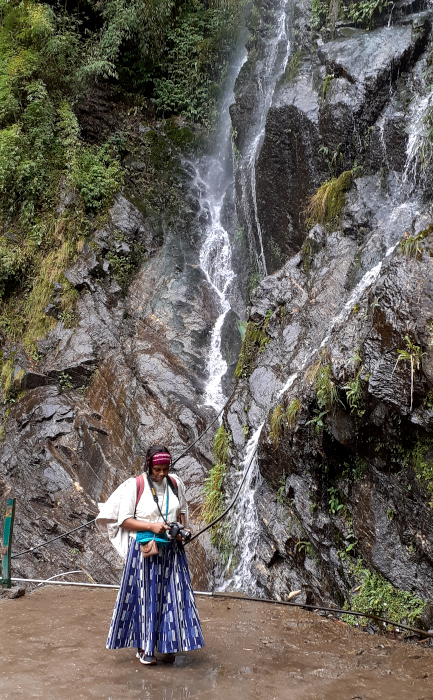
The weather was exceptionally wonderful that day, maybe that is why we didn’t feel exhausted though we’re tired.
Here I want to mention something that is very close to my heart. Promoting Tourism, which bring sources of living hoods to the local people, is a good thing & i support it. The government should check and have strict policies to protect the nature and its beauty from getting destroy too.
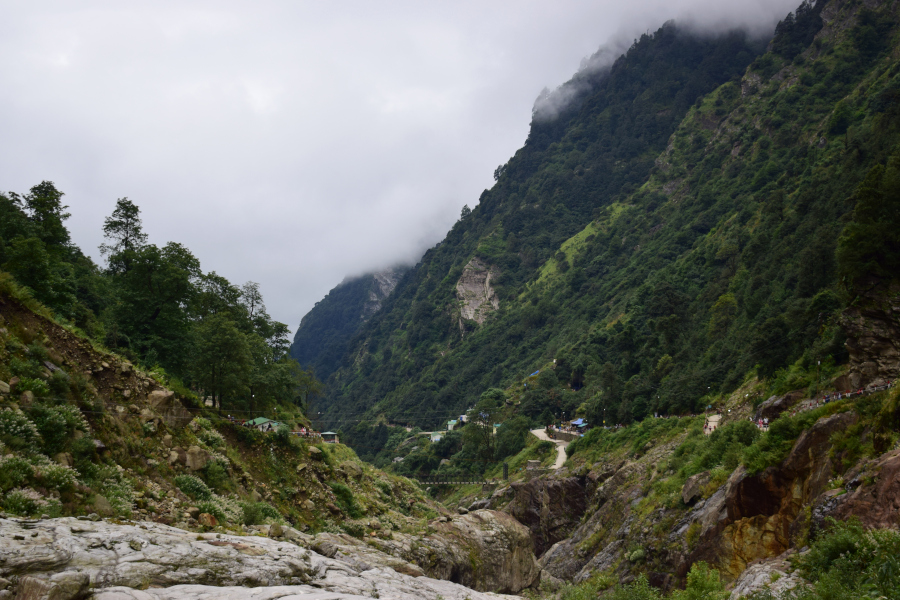
We don’t own the mountains or the river nor the waterfall neither the trees. So by cutting them and building hotels and lodges or personal houses is not a good thing. It is crime against nature … it may sound melodramatic but i truly do love nature and feel strongly that it should be protected.
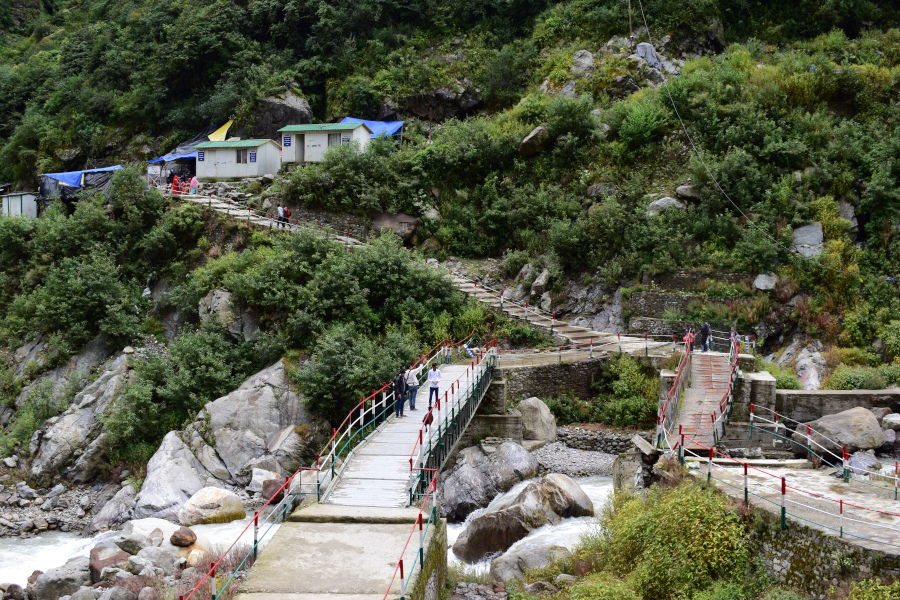
There used to be a village called “Rambara” that has been completely washed away by the massive flood in 2013. I have seen photographs of that place on various websites, to be honest, I personally like it now.
Here there is a bridge to cross the river Mandakini. We stood on the bridge for several minute and watch the river flow gushingly through the boulder-stones. Standing there, I wondered how that tiny river had became so furious and wild that it had swept away a whole living village with it.
Disaster should not happen and life should not be lost of any living being but apart from that we should learn to leave the nature as it is. We should not mend it for our benefit.
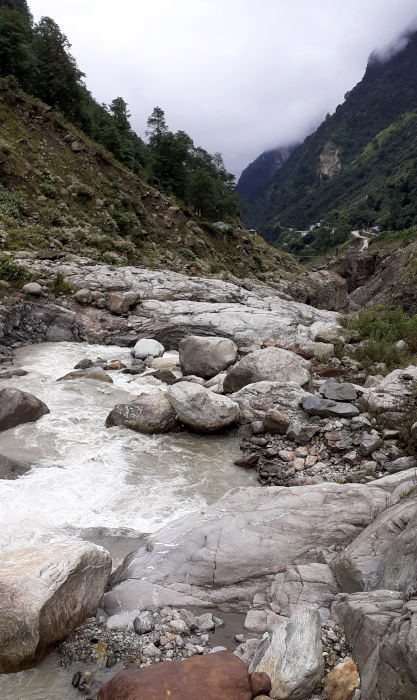

From Rambara, as we crossed the bridge and moved to the other side of the valley, we witness the most amazing site of my life… we saw floating clouds. They were coming up from Gaurikund and moving from our side of the valley to the opposite side. It was a speechless moment for me. No words and of course no photograph can capture it, what our eyes witness. I am not exaggerating at all. It was like a passing magical moment.
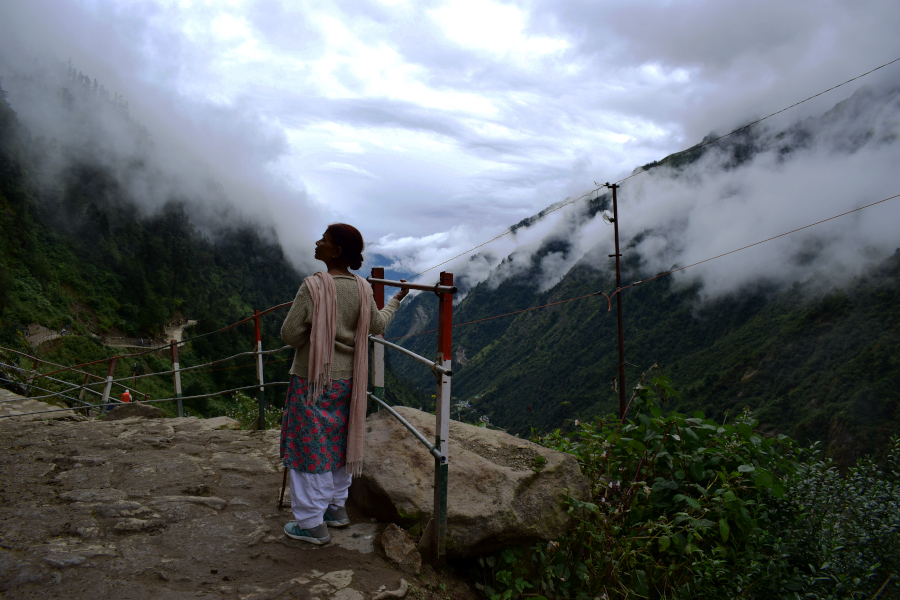
The second phrase of the route starts as you cross the bridge. The trek route is newly build after the 2013 flood. It is comparatively much steeper than the route we have been following so far. At this point, the weather became extremely beautiful with low clouds covering the whole valley. It also started to drizzle after sometime. We stopped at a roadside food stall, ate biscuits and hot maggi. When it stopped raining, we started our walk again.
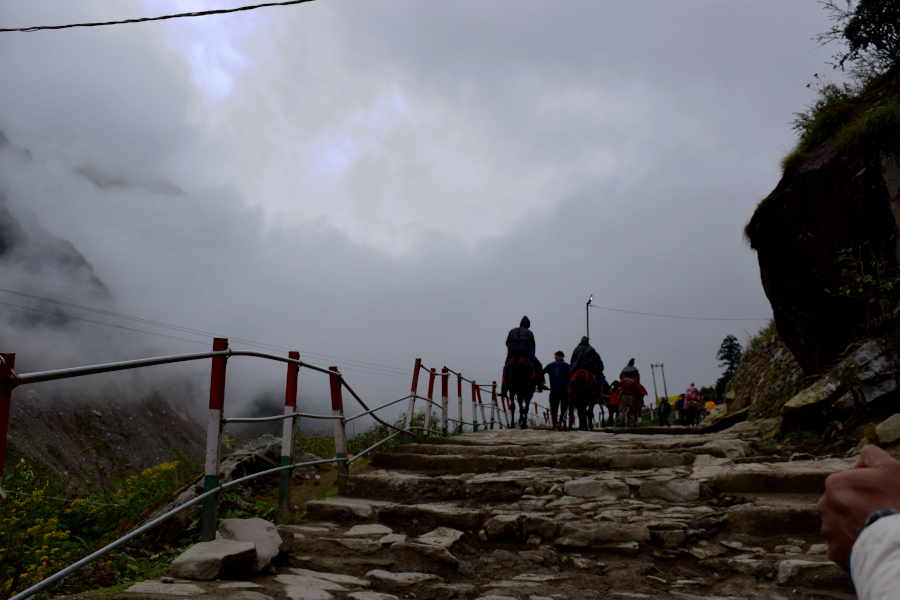


All our tiredness disappeared in after seeing this splendid view !

These were not Glaciers by definition … but they were frozen waterfall and they are frozen through out the year. Water was flowing beneath the solid frozen ice. I guess they are called “Snow Bridge”. The above one was looking extremely marvelous … no words can describe it !
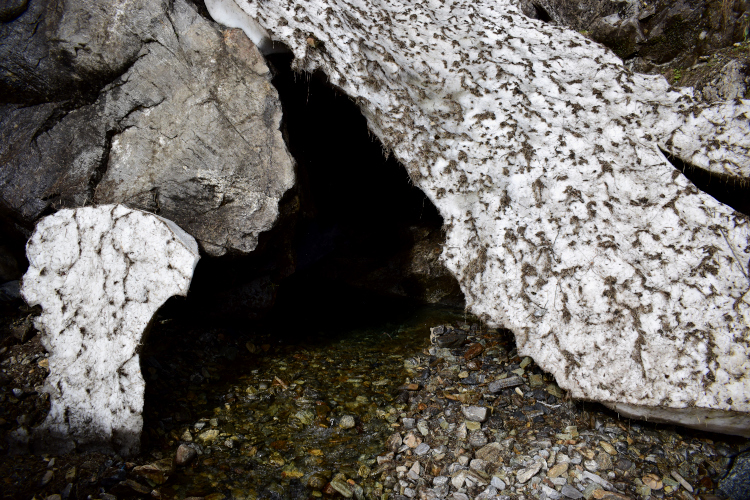


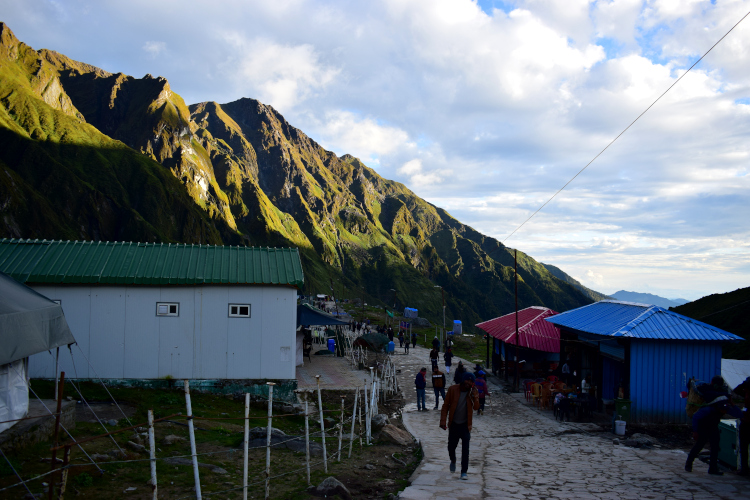
Where we stayed & what we eat :
After some 7 odd hours and witnessing some wonderful landscape and numerous waterfall – one exceeding the other in terms of beauty, we finally reached the top. By top i mean, there were no steep climb after this point. We had to walk more or less another 2 km from here to Kedarnath shrine. On our way we checked in the GMVN cabin, where we’re staying for the night.
There are many tents, huts and cottages run by the GMVN ie. Garwal Mandal Vikas Nigam. We stayed in a 6 beded hut (Rs. 750/person) with attached 2 bathroom with geyser. Each bed had 2 blankets, which were heavy but clean and soft. The night was spend very comfortably.
There are many government run canteen which provided food at fixed price. The food canteen was just in front of our cottage and the food was simple yet extremely delicious consisting of chapatis (roti) – sabzi (vegetable) – dal (lentil) – rice.
Information about other accommodation run by the GMVN :
- Tent – 10 person accommodation provided with mattress and blankets. One toilet outside for 10 person with no hot water. Cost: Rs. 300/person.
- Hut – 10 person accommodation provided with bunk bed and blankets. One attached toilet with geyser.
- Cottage – like ours.
Cost of accommodation may vary depending on the season … peak season high rent – off season low rent.
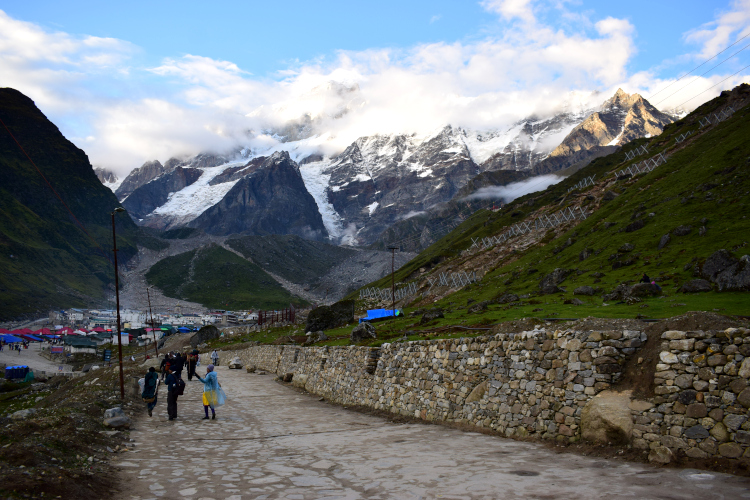
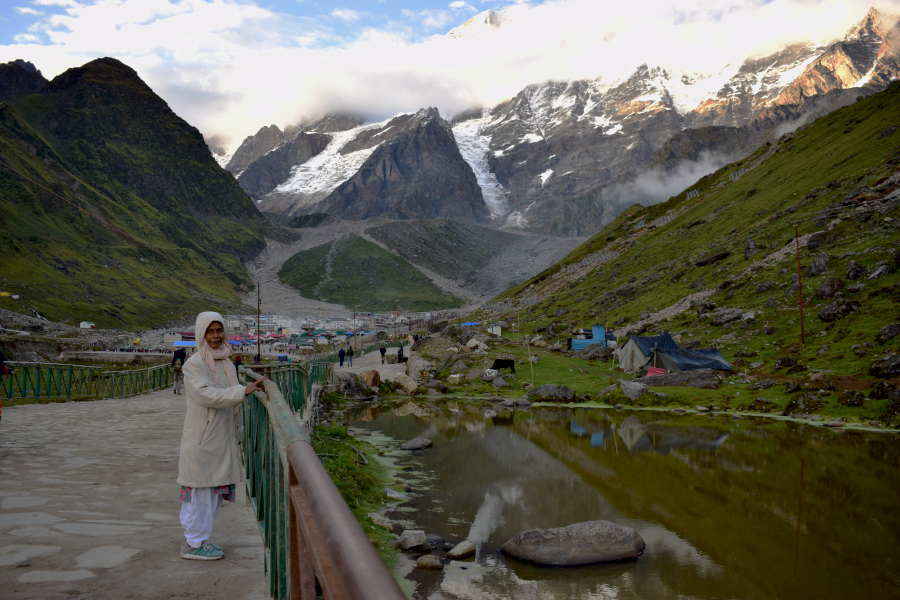
We wore all the warm clothes – jacket, muffler, woolen gloves. The sun was about to set, we walked towards the temple. The towering white snow clad mountain was looking like a God itself – changing colors from orange to gold to pink …. marvelous ! Watched this moment speechlessly too.
My only bad memories or incident was i had a bad argument – not once but twice with my mother and that too on a petty matter. Things should be handle more patiently and wisely. Except for that incident, the time spend at the temple (in and around) was a life time experience. At that moment we felt very close to the supreme being.
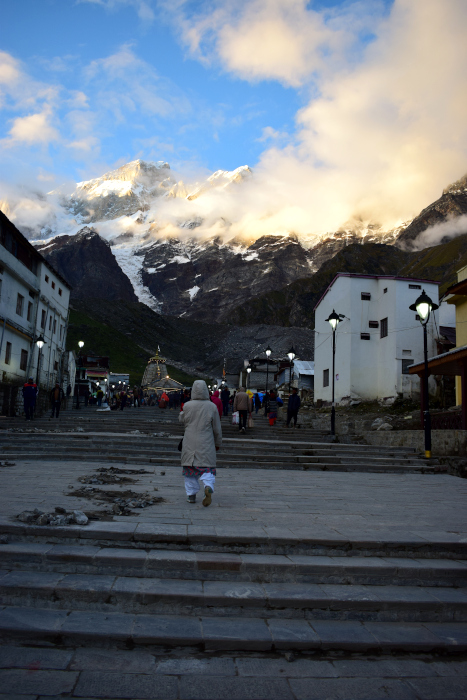
Experience inside & outside the temples:
When we reached the temple, the sun was setting down and it was getting darker minute by minute. There was a long queue outside the temple and took us nearly 1 – 1 1/2 hours to enter it. The waiting was good too. Enjoyed and felt the every moment of being there amidst such beautiful surreal surrounding. People in groups were singing devotional song and chanting mantras, making that moment more emotional and spiritual.
Inside the temple, it was not over crowded like it is in April – May (peak season). Still we didn’t get to stand in front of the main temple door for even 10 seconds. I just remember that i saw a triangular form covered (i mean decorated) with colorful flowers with “Shash Nag” towering over the triangular form. Later i came to know that it was the conical shape rock, which i had read about. As i had not seen the “Lingam” in the front, i assumed that it was kept behind the conical rock form. Everything was decorated with flowers and because we didn’t get enough time to get a proper glimpse inside the temple, i really wouldn’t figure out where the “Lingam” was. Maybe in the morning, when there is no flower decorations, we might have seen it much easily and properly. Flower decoration has its own charm & beauty too. I had seen it that way, hence i liked it that way !
Anyway, i believe that the Lord is not only residing inside the temple. HE is everywhere – in the chill fresh air – in that last glimpse of setting sun – in the flowing water of Madakini river or maybe on Nandi’s (the bull) back … taking in some fresh air – everything is possible … who knows !! I am sure HE doesn’t always like to be dress up and sit inside the temple all the time, so that HIS devotees get a glimpse of HIM. I am sure HE is everywhere.
Enough of my thoughts and theories – Let’s move on !
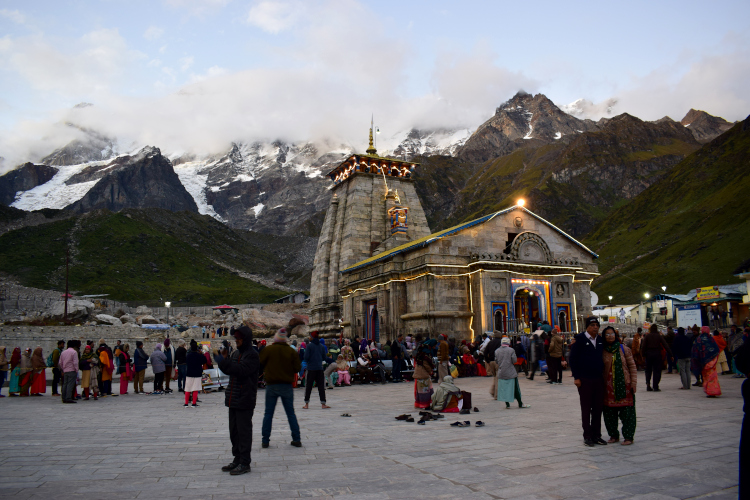
There are few interest facts and tales about the Kedarnath Temple:
- Kedarnath temple is dedicated to Lord Shiva. It is worshiped in form of “Lingam” which is irregular in shape. This is one of the 12 holy Jotrilingam. There is also a conical shaped rock which is also worshiped as Sadashiva (a form of Lord Shiva).
- The story behind why it is worshiped as Lingam. According to folk legend – Nara & Narayan (two incarnations of Lord Vishnu) went to Kedarnath and worshiped Lord Shiva. Pleased with their devotion, Lord Shiva appeared in front of them and offered them a boon. In return, they asked Lord Shiva to stay there in his original form (that is the Lingam form) for the salvation of mankind. Lord Shiva granted them their wish and made Kedarnath His home. Hence the worship of the Lingam.
- Second story : Post war, The Pandava brothers wanted to seek Lord Shiva’s forgiveness as they had killed their kins during the war. Lord Shiva didn’t want to see them hence turned in to a bull and tried to disappear by sinking himself (head first) in the ground. One of the Pandava brother (Bhima) caught hold of the bull from the back. He wanted to pull him out and force him to reappear. Lord Shiva disguised as a bull, did appeared but in five different parts at five different places ( the face at Rudranath – arms at Tungnath – navel & stomach at Madhyamaheshwar – hairs at Kaleshwar – and Hump at Kedarnath). Hence the worship of the conical shaped rock.
- The temple is believed to be built in the 7th – 8th century by the Pandavas of Mahabharat. Later in the 12th century reconstructed by Adi Shankaracharya.
- The temple is built using large stone slabs and it is built on a 6 ft high rectangular platform.
- The temple consist of 2 parts : the front part or the hall which has a lower roof compare to the back part or the main temple. The front hall has many deities statues (from Mahabharat) curved on its wall. The back part, which is the main temple has the “Lingam” and the conical rock form.
- There are many pujas performed or held in the Kedarnath temple. Four pujas in the morning and two pujas in the evening. The minimum cost of the puja is Rs. 340/person and maximum Rs. 1700/person. “Darshan” is free … Thank God for that ! (money business everywhere)
- Geologists say that the temple was under the snow for nearly 400 years (1300 – 1900 AD). This period known as ” Little Ice Age”. Scientists say that people who built the temple knew the terrain very well ie. they knew about the formation of snow and glaciers. They made the temple strong enough to withstand natural disaster.
- There is a massive boulder just behind the temple, which is believed to have save the temple during the 2013 epic flood, by blocking the path of the water and saved the temple from being washed away. Everyone believes in miracle, i am sure nobody is interested in knowing how strong the temple is built.
- Due to the extreme weather, the temple is open to the public from April (Akshaya Tritiya) till November (Kartik Purnima – Autumn full moon). The deity is carried down to UKhimath. There it is worshiped for the next 6 months.
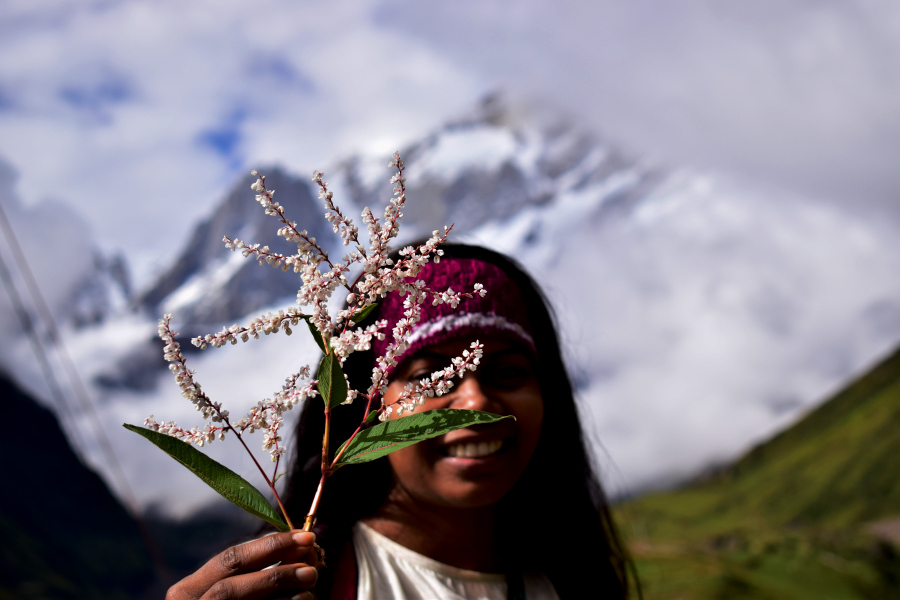
Next day … descending journey to Gauri Kund :
Next day, we began our descending journey at 05:30 in the morning. Only me & Maa were coming by foot – others were taking the horse. We didn’t stop much in the way as we had to reach Gaurikund as fast as possible.
Two noticeable thing happened during this journey :
- As we were walking down the hills, i was surprised and couldn’t believe that we had actually climbed those steep up hill path.
- Walking down hill gave us sore legs – i couldn’t believe that too. When we went to Kedarnath temple, we had no body ache – no pain – absolutely nothing … but while coming down hill – our leg were sore and had body pain too. Next day we were fine.
We complete our return journey in 4 1/2 hrs. This was the end of our Kedarnath trip … from here we headed towards Badrinath temple.
P.S. One thing i forgot to write in my first part Kedarnath Trip that mostly all the hotels at Sonprayag were budget hotels. They provide basic facilities – like hot water – blankets – home cooked food – and above all clean bathrooms. It is extremely important to me, one can sleep on hard bed but definitely can’t use dirty toilets for sure. We stayed at Akash Ganga [Rs.1800 for 2D-1N for 2 rooms with 3 beds each] … Over all it good.
